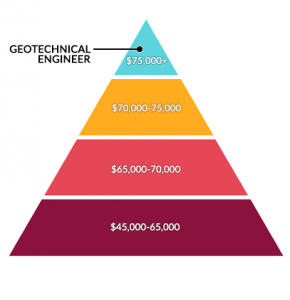Some Of Geotheta
Some Of Geotheta
Blog Article
Unknown Facts About Geotheta
Table of ContentsHow Geotheta can Save You Time, Stress, and Money.The 9-Minute Rule for GeothetaIndicators on Geotheta You Should KnowThe smart Trick of Geotheta That Nobody is DiscussingNot known Details About Geotheta

They conduct site examinations, gather examples, execute laboratory examinations, and evaluate information to assess the viability of the ground for building projects - Geotechnical Engineers. Based on their searchings for, geotechnical designers offer suggestions for structure style, incline stability, retaining structures, and reduction of geotechnical hazards. They team up with various other specialists, such as architects, structural engineers, and building and construction groups, to guarantee that geotechnical factors to consider are incorporated right into the total project layout and application
By assessing the behavior and residential or commercial properties of soil and rock, they can determine potential geotechnical hazards such as landslides, soil settlement, or slope instability. Their expertise helps avoid failures or mishaps that might threaten lives and residential or commercial property. Here are some comprehensive tasks and responsibilities of a geotechnical engineer: Website Examination: Geotechnical designers conduct site examinations to gather information on subsurface problems.
They translate the information to comprehend the homes and habits of the soil and rock, including their strength, leaks in the structure, compaction attributes, and groundwater problems. Geotechnical Analysis and Design: Geotechnical designers analyze the information gathered throughout website examinations to examine the security and viability of the site for construction jobs. They carry out geotechnical calculations and modeling to review factors such as birthing ability, negotiation, incline stability, lateral planet stress, and groundwater flow.
An Unbiased View of Geotheta
Structure Design: Geotechnical designers play an important duty in designing foundations that can safely sustain the intended structure. They examine the dirt conditions and lots needs to establish the appropriate foundation kind, such as shallow foundations (e.g., footings), deep foundations (e.g (https://www.imdb.com/user/ur185987626/?ref_=nv_usr_prof_2)., heaps), or specialized methods like dirt enhancement. They take into consideration factors such as negotiation limitations, birthing capability, and soil-structure communication to establish optimal foundation designs
They examine construction strategies, display site activities, and conduct area examinations to confirm that the layout referrals are adhered to. If unforeseen geotechnical concerns arise, they assess the scenario and supply suggestions for remediation or adjustments to the design. Threat Analysis and Reduction: Geotechnical designers analyze geotechnical risks and risks connected with the job site, such as landslides, liquefaction, or soil erosion.

Collaboration and Communication: Geotechnical designers work carefully with other professionals entailed in a task, such as architects, architectural engineers, and construction teams. Reliable communication and partnership are vital to incorporate geotechnical considerations right into the total task style and building and construction process. Geotechnical engineers give technical proficiency, solution inquiries, and make certain that geotechnical demands are met.
The 7-Second Trick For Geotheta
Right here are some kinds of geotechnical engineers: Foundation Engineer: Foundation designers focus on making and evaluating foundations for structures. They examine the soil problems, load demands, and website qualities to establish one of the most appropriate foundation type and style, such as superficial structures, deep structures, or specialized techniques like pile structures.
They assess the variables affecting incline security, such as dirt homes, groundwater conditions, and slope geometry, and create techniques to protect against incline failures and mitigate dangers. Quake Engineer: Quake engineers concentrate on analyzing and developing structures to stand up to seismic pressures. They evaluate the seismic hazard of a website, evaluate soil liquefaction capacity, and create seismic design criteria to make sure the security and durability of structures throughout quakes.
They do field testing, gather examples, and examine the gathered data to characterize the soil residential properties, geologic formations, and groundwater problems at a site. Geotechnical Instrumentation Designer: Geotechnical instrumentation engineers concentrate on tracking and determining the habits of dirt, rock, and structures. They install and preserve instrumentation systems that keep track of variables such as dirt settlement, groundwater levels, slope movements, and architectural variations to examine performance and give very early cautions of prospective concerns.
Not known Details About Geotheta
They perform tests such as triaxial tests, debt consolidation tests, straight shear examinations, and permeability tests to collect data for geotechnical analysis and design. Geosynthetics Engineer: Geosynthetics engineers specialize in the style and application of geosynthetic products, such as geotextiles, geogrids, and geomembranes. They utilize these products to boost soil stability, enhance slopes, supply drainage services, and control disintegration.
They tend to be investigatory individuals, which implies they're intellectual, reflective, and curious. They wonder, systematic, rational, analytical, and rational. Some of them are likewise social, suggesting they're kind, charitable, participating, individual, caring, read the full info here helpful, compassionate, sensible, and pleasant. Does this sound like you? Take our free career test to figure out if geotechnical engineer is among your top job suits.
In the workplace setting, geotechnical designers make use of specialized software application tools to perform calculations, create layouts, and assess information. They prepare reports, testimonial task specs, connect with customers and team participants, and coordinate job activities. The workplace setting offers a favorable setting for research, evaluation, and cooperation with various other experts included in the task.
Geotheta - An Overview
They regularly go to job sites to carry out website investigations, evaluate geotechnical conditions, and gather data for evaluation. These brows through include taking a trip to various places, occasionally in remote or difficult terrains. Geotechnical engineers might execute soil tasting, conduct tests, and screen construction tasks to make certain that the geotechnical aspects of the job are being executed appropriately.
Geotechnical designers additionally function in specialized geotechnical laboratories. Geotechnical laboratory engineers work extensively in these environments, dealing with screening tools, running instruments, and tape-recording data.
Report this page